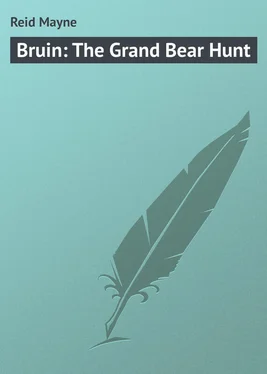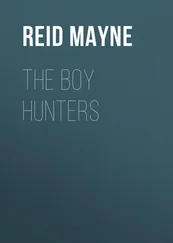Mayne Reid - Bruin - The Grand Bear Hunt
Здесь есть возможность читать онлайн «Mayne Reid - Bruin - The Grand Bear Hunt» — ознакомительный отрывок электронной книги совершенно бесплатно, а после прочтения отрывка купить полную версию. В некоторых случаях можно слушать аудио, скачать через торрент в формате fb2 и присутствует краткое содержание. Жанр: Прочие приключения, foreign_prose, на английском языке. Описание произведения, (предисловие) а так же отзывы посетителей доступны на портале библиотеки ЛибКат.
- Название:Bruin: The Grand Bear Hunt
- Автор:
- Жанр:
- Год:неизвестен
- ISBN:нет данных
- Рейтинг книги:3 / 5. Голосов: 1
-
Избранное:Добавить в избранное
- Отзывы:
-
Ваша оценка:
- 60
- 1
- 2
- 3
- 4
- 5
Bruin: The Grand Bear Hunt: краткое содержание, описание и аннотация
Предлагаем к чтению аннотацию, описание, краткое содержание или предисловие (зависит от того, что написал сам автор книги «Bruin: The Grand Bear Hunt»). Если вы не нашли необходимую информацию о книге — напишите в комментариях, мы постараемся отыскать её.
Bruin: The Grand Bear Hunt — читать онлайн ознакомительный отрывок
Ниже представлен текст книги, разбитый по страницам. Система сохранения места последней прочитанной страницы, позволяет с удобством читать онлайн бесплатно книгу «Bruin: The Grand Bear Hunt», без необходимости каждый раз заново искать на чём Вы остановились. Поставьте закладку, и сможете в любой момент перейти на страницу, на которой закончили чтение.
Интервал:
Закладка:
“Well, since papa only binds us to the brown and black, it will be a nice thing if we could fall in with a skin of the ringed and silver varieties. It would please him all the better. I wonder now what sort is this fellow we are following? By the size of his tracks he must be a wopper!”
“No doubt an old male,” rejoined Alexis; “but if I am not mistaken, we shall soon be able to determine that point. The spar gets fresher and fresher. He must have passed here but a very short while ago; and I should not wonder if we were to find him in this very ravine.”
“See!” exclaimed Ivan, whose eyes had been lifted from the trail, and bent impatiently forward; – “see! by the great Peter! yonder’s a hole, under the root of that tree. Why might it not be his cave?”
“It looks like enough. Hush! let us keep to the trail, and go up to it with caution – not a word!”
All three, now scarce breathing – lest the sound should be heard – stole silently along the trail. The fresh-fallen snow, still soft as eider-down, enabled them to proceed without making the slightest noise; and without making any, they crept up, till within half-a-dozen paces of the tree.
Ivan’s conjecture was likely to prove correct. There was a line of tracks leading up the bank; and around the orifice of the cavity the snow was considerably trampled down – as if the bear had turned himself two or three times before entering. That he had entered, the hunters did not entertain a doubt: there were no return tracks visible in the snow – only the single line that led up to the mouth of the cave, and this seemed to prove conclusively that Bruin was “at home.”
Chapter Nine.
Hybernation of Bears
As already stated, it is the custom of the brown bear, as well as of several other species, to go to sleep for a period of several months every winter, – in other words, to hybernate . When about to take this long nap, the bear seeks for himself a cave or den, in which he makes his bed with such soft substances as may be most convenient – dry leaves, grass, moss, or rushes. He collects no great store of these however – his thick matted fur serving him alike for bed and coverlet; and very often he makes no further ado about the matter than to creep into the hole he has chosen, lie down, snugly couch his head among the thickets of long hair that cover his hams, and thus go to sleep.
Some naturalists have asserted that this sleep is a state of torpidity – from which the animal is incapable of awaking himself or of being awakened, until the regular period of indulgence in it may have passed. This, however, is not the case; for bears are often surprised in their sleep, and when aroused by the hunters act just as is usual with them at other times.
It must be observed, however, that the retirement of the bear into winter quarters is not to be regarded as of the same nature as the hybernation of marmots, squirrels, and other species of rodent animals. These creatures merely shut themselves up from the cold; and to meet the exigencies of their voluntary imprisonment, they have already collected in their cells a large store of their usual food. Bees and many other insects do precisely same thing. Not so with the bear. Whether it be that he is not gifted with an instinct of providence it is difficult to say; but certain it is, that he lays up no store for these long dark days, but goes to sleep without thought of the morrow.
How he is maintained for several months without eating is one of nature’s mysteries. Every one has heard the absurd theory: that he does so by “sucking his paws,” and the ingenious Buffon has not only given credence to this story, but endeavours to support it, by stating that the paws when cut open yield a substance of a milky nature!
It is a curious fact that this story is to be found scattered all over the world – wherever bears hybernate. The people of Kamschatka have it; so also the Indians, and Esquimaux of the Hudson’s Bay territory, and the Norwegian and Lap hunters of Europe. Whence did these widely-distributed races of men derive this common idea of a habit which, if the story be a true one, must be common to bears of very different species?
This question can be answered. In northern Europe the idea first originated – among the hunters of Scandinavia. But the odd story once told was too good to be lost; and every traveller, since the first teller of it, has taken care to embellish his narrative about bears with this selfsame conceit; so that, like the tale of the Amazon women in South America, the natives have learnt it from the travellers, and not the travellers from the natives!
How absurd to suppose that a huge quadruped, whose daily food would be several pounds weight of animal or vegetable matter – a bear who can devour the carcass of a calf at a single meal – could possibly subsist for two months on the paw-milk which Monsieur Buffon has described!
How then can we account for his keeping alive? There need be no difficulty in doing so. It is quite possible that during this long sleep the digestive power or process is suspended, or only carried on at a rate infinitesimally small; that, moreover, life is sustained and the blood kept in action by means of the large amount of fat which the bear has collected previous to his going to bed . It is certain that, just at their annual bed time , bears are fatter than at any other season of the year. The ripening of the forest fruits, and the falling of various seeds of mast-worts, upon which, during the autumn, bears principally subsist, then supply them with abundance, and nothing hinders them to get fat and go to sleep upon it. They would have no object in keeping awake: were they to do so, in those countries where they practise hybernation, they would certainly starve, for, the ground being then frozen hard, they could not dig for roots, and under the deep covering of snow they might search in vain for their masts and berries. As to foraging on birds or other quadrupeds, bears are not fitted for that. They are not agile enough for such a purpose.
They will eat both when they can catch them; but they cannot always catch them; and if they had no other resource in the snowy season the bears would certainly starve. To provide them against this time of scarcity, nature has furnished them with the singular power of somnolence. Indeed, that this is the purpose is easily proved. It is proved by the simple fact that those bears belonging to warm latitudes, as the Bornean, Malayan, and even the black American of the Southern States, do not hybernate at all. There is no need for them to do so. Their unfrozen forests furnish them with food all the year round; and all the year round are they seen roaming about in search of it. Even in the Arctic lands the polar bear keeps afoot all the year; his diet not being vegetable, and therefore not snowed up in winter. The female of this species hides herself away; but that is done for another purpose, and not merely to save herself from starvation.
That the stock of fat, which the bear lays in before going to sleep, has something to do with subsisting him, is very evident from the fact that it is all gone by the time he awakes. Then or shortly afterwards, master Bruin finds himself as thin as a rail; and were he to look in a glass just then, he would scarce recognise himself, so very different is his long emaciated carcass from that huge plump round body, that two months before he could scarce squeeze through the entrance to his cave!
Another great change comes over him during his prolonged sleep. On going to bed, he is not only very fat, but also very lazy; so much so that the merest tyro of a hunter can then circumvent and slay him. Naturally a well-disposed animal – we are speaking only of the brown bear ( ursus arctos ) though the remark will hold good of several other species – he is at this period more than usually civil and soft-tempered. He has found a sufficiency of vegetable food which is more congenial to his taste than animal substances; and he will not molest living creature just then, if living creature will only let him alone. Aroused from his sleep, however, he shows a different disposition. He appears as if he had got up “wrong side foremost.” His head aches, his belly hungers, and he is disposed to believe that some one has stolen upon him while asleep, and robbed him of his suet. Under this impression he issues from his dark chamber in very ill humour indeed. This disposition clings to him for a length of time; and if at this period, during his morning rambles, he should encounter any one who does not get speedily out of his way, the party thus meeting him will find him a very awkward customer. It is then that he makes havoc among the flocks and herds of the Scandinavian shepherd – for he actually does commit such ravages – and even the hunter who meets him at this season will do well to “ware bear.”
Читать дальшеИнтервал:
Закладка:
Похожие книги на «Bruin: The Grand Bear Hunt»
Представляем Вашему вниманию похожие книги на «Bruin: The Grand Bear Hunt» списком для выбора. Мы отобрали схожую по названию и смыслу литературу в надежде предоставить читателям больше вариантов отыскать новые, интересные, ещё непрочитанные произведения.
Обсуждение, отзывы о книге «Bruin: The Grand Bear Hunt» и просто собственные мнения читателей. Оставьте ваши комментарии, напишите, что Вы думаете о произведении, его смысле или главных героях. Укажите что конкретно понравилось, а что нет, и почему Вы так считаете.












